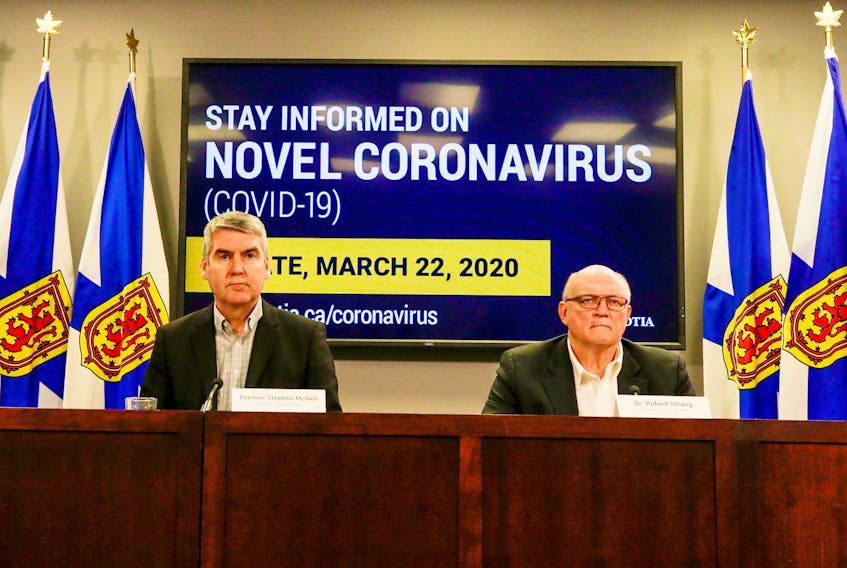HALIFAX, N.S. — The actions of a few who jammed up roads leading to beaches on the weekend have affected the freedoms of the many as Nova Scotia authorities try to press home the importance social distancing.
During Monday's update on the state of COVID-19 in Nova Scotia, Premier Stephen McNeil and Dr. Robert Strang, the province's chief medical officer of health, once again stressed the need to avoid getting physically close to others to keep the disease from spreading.
Reports emerged over the weekend of cars lining roadways as crowds sought to go to public beaches. On Sunday, the province declared a state of emergency, shut down access to provincial beaches, limited groups to no more than five people and empowered authorities to enforce the restrictions with heavy fines if necessary.
“I have said if you have to drive to get your exercise, you're going too far,” McNeil said during Monday's update. “What we need you to do is walk for exercise, not to socialize. And you can do that in your community.
“If you live near a trail, go on the trail, but if you're driving to go to the parking lot, stay in your own community. Walk the block. Walk around your house. Walk along the side of the road that you live on. But what we're asking people is not to drive to public spaces.”
The premier said massive traffic jams and hundreds of people gathering in places “defeats the purpose of what Dr. Strang has been talking about, about keeping people safe. We're asking people to self-isolate in their own home and for the exercise, do that in your own community.”
People aren't necessarily just being idiots, said Simon Sherry, a clinical psychologist and professor at Dalhousie University.
“When you restrict people's liberty – perhaps especially when you restrict the liberty of North Americans, where liberty is prized – there can be some pushback there,” Sherry said in a telephone interview on Monday.
He said there are better ways to encourage the behaviour Dr. Strang and the premier want without taking a hard approach.
Sherry said he was concerned by the province's message track and would have preferred one that emphasized the altruistic choice of self-isolation as an action for the good of the community.
“We want … to point out to people that other people – vulnerable people – will benefit from their actions, that we can keep some of the more vulnerable members of our population safe by engaging in these actions,” he said.
“And there are other key bits to this. We need to create within Nova Scotians a mental model for why it's necessary to engage in social distancing, self-isolation, hand hygiene, and the like. We need to offer people a strong rationale for why they should do this. To help them understand how hand hygiene is crucial to preventing the spread of COVID-19 or help them appreciate why social distancing is essential to these current efforts. And beyond providing that rationale, and offering that mental model for why this is working, we need to fairly rapidly create new social norms. We need to capitalize on the fact that people care about what other people think.”
He cited the example of public washrooms at a big event where people wash their hands more if others are watching.
Sherry said we need to find a sweet spot between the right levels and right type of emotions, following anxiety with reassurance that following the recommendations will keep them safe.
“I can say this: I moved to this province in 2007 from larger cities and I noticed immediately that people were kind and altruistic and neighbourly here in ways that I hadn't observed before,” Sherry said. “I actually think those are some of Nova Scotians' best qualities and why I've chosen to make my home here. And I think we need to appeal to I think the already pre-existing good-natured altruism of Nova Scotians to carry through on these behaviours.”
Some have responded by ignoring recommendations, while others have taken to social media to call them out, coining the term “covidiots.”
Sherry is advocating patience.
“Behaviour change is difficult and we're asking the population to change behaviour in short order without providing them with a lot of support to do so. We need to be patient and we need to be compassionate and we need to realize people are more likely to adopt behaviour change with an altruistic message track paired with patience and compassion.”









